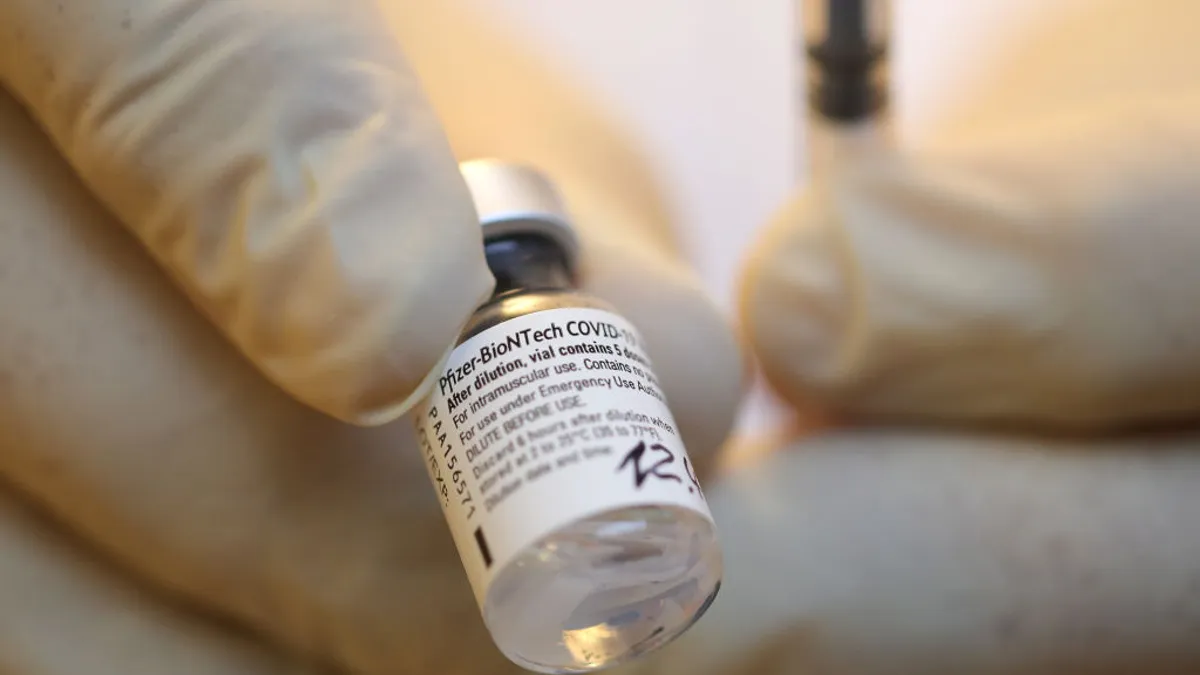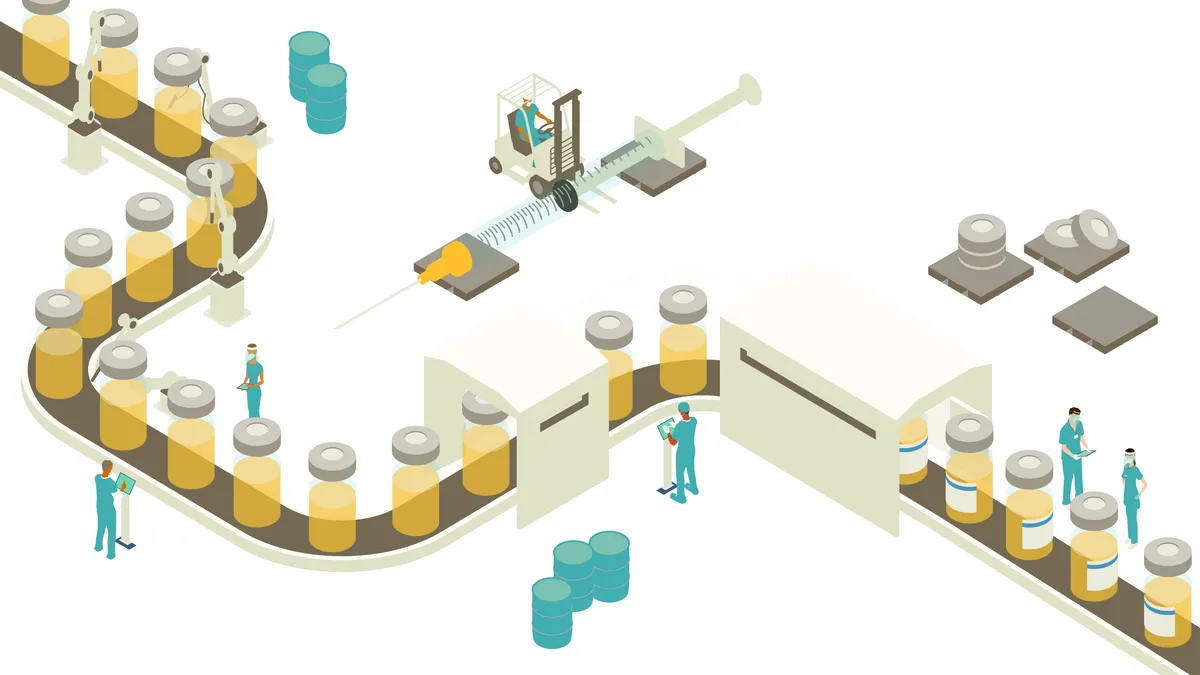BioNTech found runaway success during the COVID-19 pandemic when its Pfizer-partnered mRNA vaccine propelled the biotech to new heights. But now, with demand for the vaccine substantially lower and revenues way down in the first half of 2024, the pandemic darling is hedging its bets that an oncology pipeline will pay off in the coming years.
BioNTech’s meteoric rise has been met with a continued fall in 2024 following declining revenues in 2023. For the first half of the year, total revenues reached $347 million, down 119% from $1.6 billion during the same period in 2023, according to the company’s most recent earnings report.
When COVID-19 vaccine sales were at their peak in 2021 and 2022, BioNTech reported yearly revenues of nearly $21 billion and $19 billion, respectively. Total losses for the company in the first half of 2024 reached $885 million.
With vaccine revenues down, BioNTech is ramping up its pipeline to find another potential blockbuster, increasing R&D spending 55% to $1.2 billion during the first six months of 2024 compared to the first half of 2023. The biotech currently has more than 40 candidates in the pipeline, including four in phase 3 trials, betting big on mRNA and establishing an mRNA manufacturing facility in Rwanda. Earlier this year, BioNTech said it expects to have 10 cancer indication approvals by 2030, starting with launches from 2026 onward.

But the COVID-19 focus isn’t over yet. CEO Uğur Şahin noted BioNTech has initiated the launch of a “new variant-adapted vaccine” that is expected to be approved and distributed in the “coming weeks and months,” he said during the earnings call with investors. Ryan Richardson, chief strategy officer, doubled down and said the COVID-19 products are “still a driver of our overall margins.”
mRNA cancer pipeline
Of the drugs in BioNTech’s pipeline, BNT111, an mRNA cancer vaccine being studied in melanoma, is a strong candidate, according to Lee Brown, global sector lead for healthcare at research firm Third Bridge. The vaccine, which triggers an immune response in patients with advanced melanoma, received fast track and rrphan drug designation from the FDA. The company recently released positive topline results from a phase 2 study in July, meeting the primary endpoint and improving overall response rate in combination with Regeneron’s Libtayo, Brown said.
The vaccine is a proof of concept for BioNTech’s off-the-shelf mRNA platform, dubbed FixVac, which has the flexibility to target multiple non-mutated antigens in most patients with a given tumor type, according to chief medical officer Dr. Özlem Türeci. Its other mRNA vaccine platform, iNeST, produces vaccines on demand and personalized to each patient.
“This preliminary result is a significant milestone for our company and underscores our belief in the transformative potential of this new class of medicines and of our mRNA vaccine technology, which is a key pillar of our oncology strategy,” Sahin said in the earnings call.
The cancer vaccine market has legs, too, with the potential to reach more than $30 billion by the end of 2033, according to a prediction from consulting firm Towards Healthcare. However, BioNTech is not the only drugmaker working on a skin cancer vaccine. Merck & Co. and mRNA biotech Moderna also recently released mid-stage study results for their cancer vaccine in combination with Keytruda, finding the vaccine significantly boosted survival rates.
Oncology strategy
Elsewhere in the pipeline is BNT323, an antibody-drug conjugate candidate targeting the HER2 protein in metastatic breast cancer. BioNTech began a late-stage trial in January to test for progression-free survival. BioNTech is working with DualityBio on the candidate, and Richardson noted the company is expecting data from the phase 3 trial next year, with the potential for a 2026 launch. The drug also received breakthrough designation.
Another candidate in BioNTech’s R&D machine is its novel immuno-oncology drug BNT327, an anti-VEGF-A antibody candidate co-developed with Biotheus. The company is currently evaluating it as a combination therapy for multiple cancers, with plans to initiate more trials in the next 12 months, including potentially in combination with chemotherapy. BNT327 combines two validated mechanisms of action that blocks tumor angiogenesis and reduces tumor cell proliferation and survival.
“These novel BNT327 combinations may open up new areas of activity for our anti-VEGF-A and anti-PD-L1 molecule,” Tureci said during the earnings call.
But while BioNTech is planning to expand trials, Summit Technologies is further along with a similar drug candidate, ivonescimab, that also makes use of both the PD-1 and VEGF pathways. The company is already in phase 3 trials with the candidate, while BioNTech is launching its late-stage studies this year.
BioNTech is pursuing BNT327 more broadly in its approach.
“Our approach here is to be broad with regard to the indications, which we will pursue also in potentially registrational trials,” Türeci said. “We are well poised for that. …We have a wealth of data already and can pick the indications and expand that as they mature.”
Despite promising candidates under development, not everything in the pipeline is still moving forward. BioNTech ended its partnership with Danish biopharma Genmab in pursuit of phase 3 trials for acasunlimab, a PD-L1x4-1BB bispecific antibody. Genmab is moving forward with further development on its own, the company said earlier this month. The drug is designed to elicit an anti-tumor response by activating 4-1BB on T cells and natural killer cells through simultaneous binding of the PD-L1 arm.




















